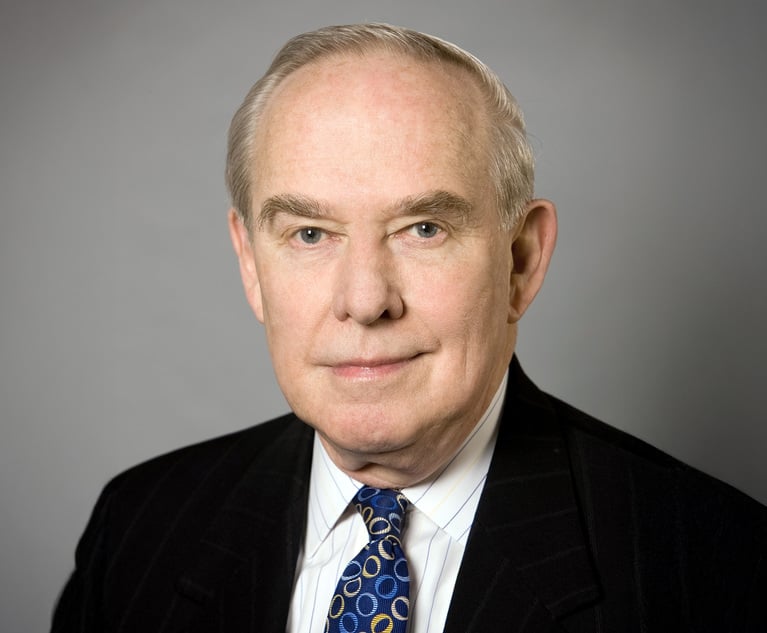 Edward Kang, with Kang Haggerty. Courtesy photo
Edward Kang, with Kang Haggerty. Courtesy photo FTC Ban on Noncompetes: Antitrust Implications of Agreements
As a growing body of academic literature asserts, noncompetes are restraints against competition, and they are harmful to both employees and the economy. As one of the major levers that the federal government has over the economy, antitrust laws can provide significant deterrence to abuse of noncompetes by employers.
May 17, 2024 at 12:12 PM
9 minute read
Massachusetts's Route 128 high-tech corridor was supposed to be America's high-tech capital. In the 1970s, armed with talents from Harvard and MIT and home to computer companies like Digital Equipment Corp. and Wang Laboratories, the Boston metro area was leading the charge for minicomputer innovation. Back then, the total technology employment in the area was roughly triple that of Silicon Valley, and the notion of Silicon Valley outshining Boston as the high-tech capital seemed implausible. Fast forward to 1995. Silicon Valley saw the highest increase in export sales among U.S. metro areas, while Boston did not make the top five. What explains Silicon Valley's rise and Boston's decline? Legal scholars have identified one key reason: while most states, including Massachusetts, enforce noncompete agreements, California does not. The result was a strikingly open culture in Silicon Valley where employees are free to go from one company to another or start their own, enabling and sustaining more successful regional development. In the last decade, there has been a surge in public initiatives including new legislations and regulatory initiatives aiming to reign in employers' use of noncompetes, with the most recent example being the FTC's issuance of its final rule banning nearly all noncompete agreements. The final rule has yet to take effect, however, and legal challenges are already looming. Rather than just describing the new FTC rule, we should examine noncompetes' anticompetitive effects, a critical aspect of the rule's underlying rationale. As a growing body of academic literature asserts, noncompetes are restraints against competition, and they are harmful to both employees and the economy. As one of the major levers that the federal government has over the economy, antitrust laws can provide significant deterrence to abuse of noncompetes by employers.
This content has been archived. It is available through our partners, LexisNexis® and Bloomberg Law.
To view this content, please continue to their sites.
Not a Lexis Subscriber?
Subscribe Now
Not a Bloomberg Law Subscriber?
Subscribe Now
NOT FOR REPRINT
© 2025 ALM Global, LLC, All Rights Reserved. Request academic re-use from www.copyright.com. All other uses, submit a request to asset-and-logo-licensing@alm.com. For more information visit Asset & Logo Licensing.
You Might Like
View All
Bondi and Big Tech: What Trump's Choice for US AG Could Mean for Antitrust Enforcement
7 minute readTrending Stories
Who Got The Work
Michael G. Bongiorno, Andrew Scott Dulberg and Elizabeth E. Driscoll from Wilmer Cutler Pickering Hale and Dorr have stepped in to represent Symbotic Inc., an A.I.-enabled technology platform that focuses on increasing supply chain efficiency, and other defendants in a pending shareholder derivative lawsuit. The case, filed Oct. 2 in Massachusetts District Court by the Brown Law Firm on behalf of Stephen Austen, accuses certain officers and directors of misleading investors in regard to Symbotic's potential for margin growth by failing to disclose that the company was not equipped to timely deploy its systems or manage expenses through project delays. The case, assigned to U.S. District Judge Nathaniel M. Gorton, is 1:24-cv-12522, Austen v. Cohen et al.
Who Got The Work
Edmund Polubinski and Marie Killmond of Davis Polk & Wardwell have entered appearances for data platform software development company MongoDB and other defendants in a pending shareholder derivative lawsuit. The action, filed Oct. 7 in New York Southern District Court by the Brown Law Firm, accuses the company's directors and/or officers of falsely expressing confidence in the company’s restructuring of its sales incentive plan and downplaying the severity of decreases in its upfront commitments. The case is 1:24-cv-07594, Roy v. Ittycheria et al.
Who Got The Work
Amy O. Bruchs and Kurt F. Ellison of Michael Best & Friedrich have entered appearances for Epic Systems Corp. in a pending employment discrimination lawsuit. The suit was filed Sept. 7 in Wisconsin Western District Court by Levine Eisberner LLC and Siri & Glimstad on behalf of a project manager who claims that he was wrongfully terminated after applying for a religious exemption to the defendant's COVID-19 vaccine mandate. The case, assigned to U.S. Magistrate Judge Anita Marie Boor, is 3:24-cv-00630, Secker, Nathan v. Epic Systems Corporation.
Who Got The Work
David X. Sullivan, Thomas J. Finn and Gregory A. Hall from McCarter & English have entered appearances for Sunrun Installation Services in a pending civil rights lawsuit. The complaint was filed Sept. 4 in Connecticut District Court by attorney Robert M. Berke on behalf of former employee George Edward Steins, who was arrested and charged with employing an unregistered home improvement salesperson. The complaint alleges that had Sunrun informed the Connecticut Department of Consumer Protection that the plaintiff's employment had ended in 2017 and that he no longer held Sunrun's home improvement contractor license, he would not have been hit with charges, which were dismissed in May 2024. The case, assigned to U.S. District Judge Jeffrey A. Meyer, is 3:24-cv-01423, Steins v. Sunrun, Inc. et al.
Who Got The Work
Greenberg Traurig shareholder Joshua L. Raskin has entered an appearance for boohoo.com UK Ltd. in a pending patent infringement lawsuit. The suit, filed Sept. 3 in Texas Eastern District Court by Rozier Hardt McDonough on behalf of Alto Dynamics, asserts five patents related to an online shopping platform. The case, assigned to U.S. District Judge Rodney Gilstrap, is 2:24-cv-00719, Alto Dynamics, LLC v. boohoo.com UK Limited.
Featured Firms
Law Offices of Gary Martin Hays & Associates, P.C.
(470) 294-1674
Law Offices of Mark E. Salomone
(857) 444-6468
Smith & Hassler
(713) 739-1250








